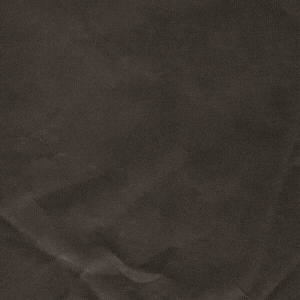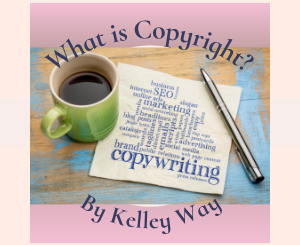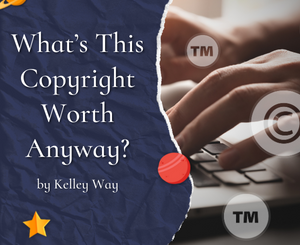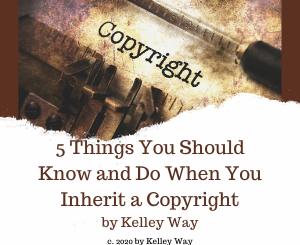Fair Use in Business: Can I Use Copyrighted Materials in My Business? by Kelley Way
 Let’s welcome back monthly columnist Kelley Way as she shares with us “Fair Use in Business: Can I Use Copyrighted Materials in My Business?” Enjoy!
Let’s welcome back monthly columnist Kelley Way as she shares with us “Fair Use in Business: Can I Use Copyrighted Materials in My Business?” Enjoy!
***
Finding the right content for your marketing materials or products is tough. Finding content that you can actually afford is even tougher. Add in the possibility that a copyright owner might come out of nowhere and sue you makes you wonder if adding content is even worth it. Here are my suggestions on the use of copyrighted materials in your business.
The Use of Copyrighted Materials in Your Business
Of course, you could always ask for permission. But first, you would have to know who the owner is, and then you’d have to figure out how to contact them, and there’s always the chance that they’ll say no (or ask for an outrageous fee.)
You could also look for content online that’s free or low cost. That often works well for pictures, but not as well for music or movie clips. And public domain works (content whose copyright has expired, or that never had a copyright in the first place) can be useful if you want something historical or government-related, but otherwise often isn’t a good fit.
So where does that leave you?
Fair Use in Business
If permission or publicly available content won’t work, you could always fall back on fair use.
Fair use exists because Congress recognized that some uses serve a public benefit, but getting permission would be like finding Waldo or asking a grouchy dragon for a few of his coins.
A for-profit business can have their use be considered a fair use, but there are a few precautions they should take to lower the risk of a lawsuit:
Precautions for Fair Use in Business
Use the content for education, criticism, commenting, or news reporting.
These uses are more likely to be considered fair use than, say, charging money for a feature-length movie and handing out your advertising material with the popcorn.
Use only a small portion of the original work.
This applies more to books and movies than artwork. Showing Gone with the Wind in its entirety is likely to get you into trouble; showing a thirty-second clip to illustrate a point (especially an educational point) would probably pass muster.
Make sure your use is not a substitute for the original.
The entire reason we have copyright protection is to make sure that copyright owners can profit from their creations.
This is also the reason many copyright owners go after infringers.
If you create beautiful prints of a great photo, with advertising material on the back, recipients probably wouldn’t feel the need to buy the photo from the artist. Or if you created a video with a complete song in the background, and didn’t talk over the song, people might listen to your ad on YouTube instead of buying the song on iTunes.
These kinds of uses anger copyright owners because those uses mean lost sales. They also make a court more likely to find infringement rather than fair use.
Do things to make sure that’s not an issue:
- talk over music (preferably not a complete song),
- put text over pictures (or make the pictures lower quality, or bury them in your content),
- use short clips from a movie (preferably lower quality).
- You can also alter the content to make it less likely that users will choose your version over the original. Just be careful to follow the next point, which is
Make sure your use does not offend the copyright owner.
This is the other major reason many copyright owners go after infringers.
If they find your use offensive, they won’t care how much money you did or didn’t make from it.
If your use is at all controversial, or if you think the copyright owner may not approve, be very careful how you proceed. (This rule is a little looser when it comes to making fun of the work, i.e. parody, but it’s still there.)
For Further Questions on Fair Use in Business…
If you have questions about any of these points, or if you want to make sure that your use isn’t likely to rouse a dragon’s wrath, you can email me at kaway@kawaylaw.com.
***
ABOUT THE AUTHOR
Kelley Way was born and raised in Walnut Creek, California. She graduated from UC Davis with a B.A. in English, followed by a Juris Doctorate. Kelley is a member of the California Bar, and an aspiring writer of young adult fantasy novels. More information at kawaylaw.com.







